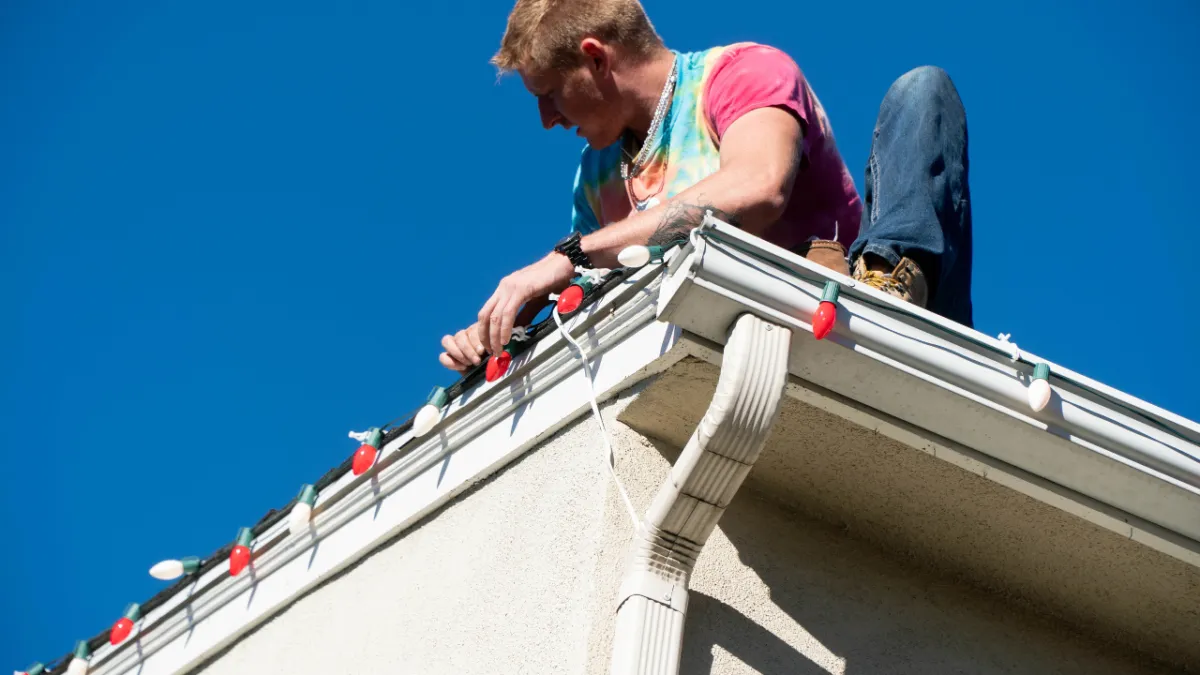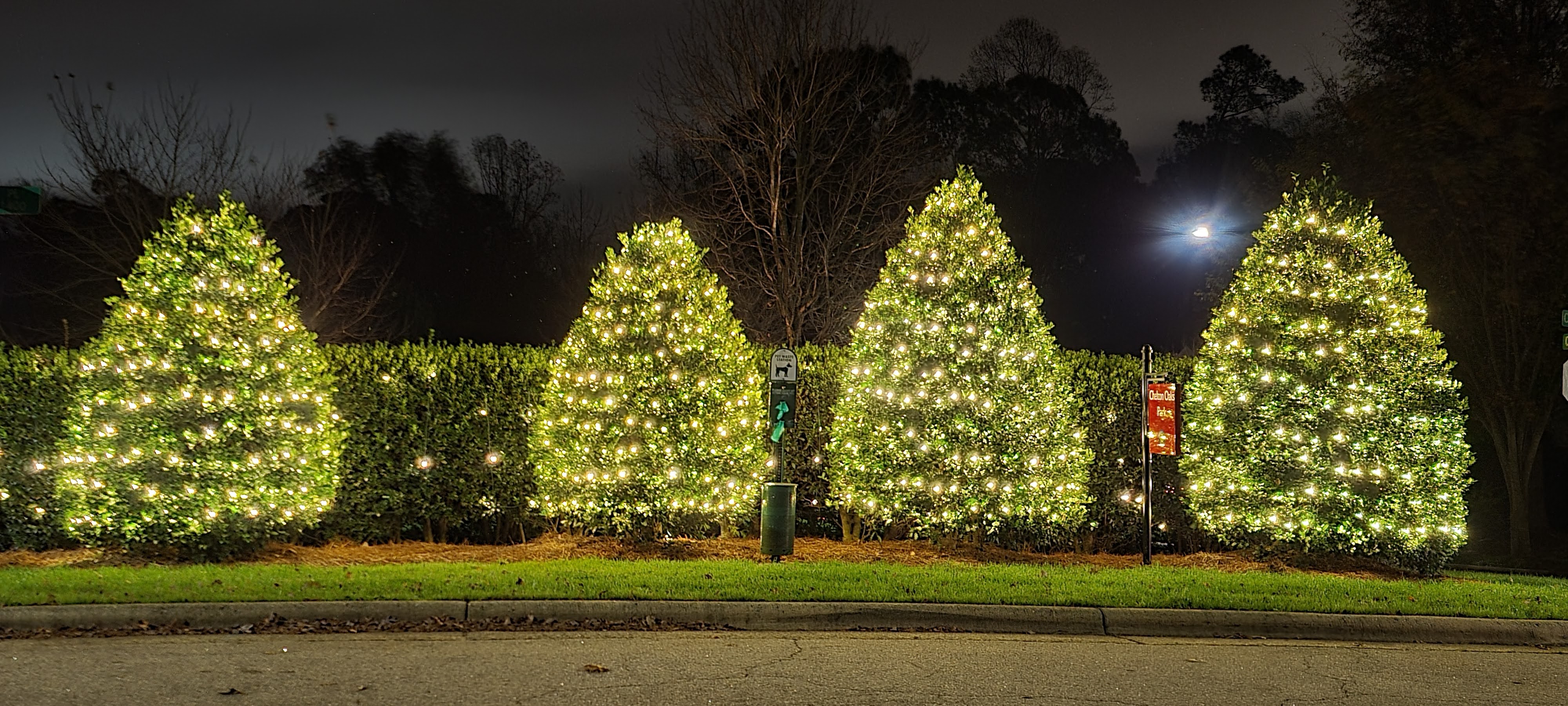Blog
Our Top Blog Posts

When do I start installing Christmas lights as a pro installer?
As the days grow shorter and the air takes on a crisp chill, you might find yourself pondering the opportune moment to begin adorning homes with festive luminescence. Traditionally, November marks the start of the Christmas light installation season, but have you considered the advantages of getting a jumpstart in October or even September? Initiating your installations earlier not only maximizes efficiency but also enhances client satisfaction. While December 10 stands as the industry's informal cut-off, navigating the timeline effectively can be a game-changer. Let's explore how tweaking your schedule could revolutionize your approach, leaving your competitors in the dark.

The Traditional Start of the Christmas Light Installation Season
You might think November is the kickoff for hanging Christmas lights, but trends are shifting. As your client list expands, you'll find starting in October, or even September, becoming more common. This earlier start helps manage the growing demand efficiently.
The shift to earlier start dates as your client lists grow
As demand surges and client lists expand, professional Christmas light installers are starting their seasons as early as October and even September, breaking away from the traditional November kickoff. This shift is influenced by several factors including seasonal weather patterns, global trends, and regional preferences which dictate the optimal time for installations. Installation innovations have also played a significant role, allowing you to tackle challenges posed by early snowfalls or shorter daylight hours more efficiently. Moreover, you're responding to customer feedback which increasingly favors longer display periods, providing more value and enjoyment from their festive decorations. Adapting to these changes ensures you stay ahead in a competitive market and meet your clients' evolving expectations, ultimately contributing to the growth and sustainability of your business.

Benefits of Starting Installations Earlier
You might wonder why you'd consider installing Christmas lights as early as October or September. Starting early lets you better schedule jobs, ensuring clients are happier and your workload is more manageable. It also means you can plan more efficiently, resulting in higher quality installations.
Better scheduling, client satisfaction, and managing workload.
Kicking off Christmas light installations in October or September brings significant benefits, including improved scheduling, heightened client satisfaction, and more manageable workloads. Starting early, you've got the advantage of addressing light safety measures meticulously, ensuring every installation is secure and safe. You'll also stay ahead of decoration trends, giving your clients the most current and appealing designs. Early starts enhance client communication, allowing for adjustments and ensuring their vision is perfectly realized. Weather considerations are less of a gamble, with more leeway to reschedule around bad weather days. Plus, you're not in a rush, meaning you can properly maintain and handle installation tools, reducing the risk of accidents or damage. This strategic approach ultimately leads to smoother operations and happier clients.
Early planning can lead to more efficient and higher quality work
Starting your Christmas light installations in October or September can significantly streamline your workflow, resulting in more efficient installations and superior quality outcomes. Early planning lets you ace material sourcing, giving you an edge in securing the best lights and decorations before the rush. You'll navigate weather considerations with ease, picking days that ensure safe and smooth work. Mastering installation techniques becomes a breeze with ample time to tackle complex designs or troubleshoot issues. Client consultations can be more thorough, ensuring their vision is perfectly captured. Plus, adhering to safety protocols without rushing reduces the risk of accidents. All in all, kicking off installations in early fall isn't just about beating the holiday rush—it's about elevating the quality of your work and ensuring a seamless season.
Typical Installation Timeline
You'll notice the period from November 1 through December 10 is when demand for Christmas light installations hits its peak. It's crucial for you to develop strategies to handle the surge in requests efficiently. Let's explore how you can manage this busy season without compromising on quality or timing.
Peak demand during this period
As November arrives, demand for professional Christmas light installation skyrockets, peaking between November 1 and December 10. You'll face weather challenges head-on, navigating icy roofs and chilly winds with ease, thanks to your adherence to rigorous safety protocols. Staying abreast of the latest lighting trends is crucial; your clients expect nothing less than the most dazzling displays, guided by their unique preferences. You'll leverage innovative technologies to streamline installations, ensuring each setup not only meets but exceeds expectations. This period demands your utmost attention to detail and flexibility, as you balance the elements, evolving trends, and customer desires to deliver unforgettable holiday cheer. Remember, it's not just about hanging lights; it's about creating magic.
Strategies for managing the influx of installation requests.
Facing the peak demand between November 1 and December 10 requires adept scheduling and prioritization to manage the influx of installation requests efficiently. You'll need to master client communication, keeping them informed of scheduling and any changes due to weather considerations. Speaking of which, always keep an eye on the forecast. Weather can throw a wrench in your plans, so having a flexible schedule is key. Regular equipment maintenance ensures you're always ready to go, preventing delays. Adjust your pricing strategies to reflect the high demand period without alienating your clientele. Lastly, have emergency protocols in place. Things can go wrong, and knowing how to handle these situations promptly keeps your operation smooth and professional.

December 10 is generally considered the last day for installations
You might wonder why December 10 stands out as the industry cut-off for installing Christmas lights. It's a date that balances the peak demand for festive decorations with practical considerations for installation schedules. Let's explore why this deadline exists and how sticking to it ensures you're not left in the dark this holiday season.
Within the Christmas light installation industry, December 10 is widely recognized as the final day to schedule your installations. You've got to consider several factors before this deadline. Weather considerations are crucial; you don't want to be caught in the cold or wet conditions, affecting both safety and the quality of the installation. Speaking of safety measures, they're paramount. The risk of accidents increases with bad weather and rushed jobs. Installation costs can also rise as the deadline approaches, given the higher demand. Furthermore, the quality of light and the possibility of custom designs may diminish as options become scarce. Ensure you're not compromising on your festive vision by waiting too long. Planning ahead ensures you get the best out of your Christmas light installation experience.
Maximizing Efficiency and Client Satisfaction
As a pro installer, you're likely feeling the crunch as December 10th looms. You'll need to master tips for effectively scheduling and managing your projects to keep up with demand. It's also crucial that you maintain high-quality installations, ensuring each client's satisfaction despite the busy season's pressure.
Tips for scheduling and managing projects throughout the busy season
Maximizing efficiency and client satisfaction during the busy season requires careful planning and strategic scheduling of your Christmas light installation projects. Start with robust client communication; keep them in the loop about scheduling and any potential delays. Weather considerations are crucial; always check forecasts and plan installations accordingly to avoid disruptions. Regular equipment maintenance ensures you're always ready for the next job, preventing unexpected breakdowns. Develop flexible pricing strategies that reflect the demand of the season but also consider the value of your aftercare services. These services not only extend the life of the installations but also maintain client relationships, ensuring they return year after year. By focusing on these areas, you'll manage your projects more effectively, keeping your clients happy and your business thriving through the holidays.

Ways to ensure quality installations despite the condensed timeframe
To ensure quality installations in a tight schedule, it's crucial to adopt efficient work practices and maintain clear communication with your clients. Factor in weather considerations to plan your installations around less inclement weather days, maximizing your productivity. Don't skimp on safety protocols; they're paramount to prevent delays and ensure both your and the client's peace of mind. Stay updated with the latest lighting technology and installation tools to expedite the process without compromising on quality. Most importantly, keep your clients in the loop. Clear, ongoing client communication about project status, any weather delays, or safety concerns ensures their expectations are managed and satisfaction is high. This approach guarantees quality installations within a condensed timeframe, balancing efficiency with client satisfaction.
Also see the Speedy Setup: How to Install Christmas Lights Quickly and Efficiently blog post for essential tips on a speedy setup.
Prepare for the Off-Season
As you wrap up this season's installations, it's crucial to start preparing for next year's rush. Reflect on what worked well and where you can improve, then use this insight to update your marketing strategies and planning activities. This approach ensures you're ahead of the game when demand picks up again.
Prepare for the next year's demand
During the off-season, you can engage in various activities and planning efforts to ensure you're ready for next year's peak Christmas light installation demand. Start with equipment maintenance to keep all your tools in top-notch condition. This period is also ideal for vendor negotiations to secure the best prices on high-quality lights and materials for the next season. Don't overlook the importance of staff training; use this time to enhance your team's skills and efficiency. Conducting a thorough market analysis helps you stay ahead of trends and customer preferences. Lastly, perform an inventory assessment to understand what you have, what's missing, and what needs to be replenished or upgraded. These steps are critical in preparing for a successful season ahead.

Importance of reflection, improvement, and marketing strategies for the upcoming season
Reflecting on the past season's successes and areas for improvement is key to enhancing your Christmas light installation business for the upcoming year. You've got to dive into customer feedback to understand their needs and expectations better. It's not just about what you think you did right, but what your customers truly valued. Competitive analysis also plays a crucial role. By looking at how others in your field are performing, you can identify gaps in your own service and pricing models.
Don't overlook the power of branding strategies and digital marketing. These are your tools for standing out in a crowded market. Adjusting your pricing models in response to market trends and customer feedback can also keep you competitive. Remember, it's about being proactive, not reactive.

How Does Weather Influence the Timing and Strategy for Christmas Light Installations, Particularly in Regions with Unpredictable Weather Patterns?
Weather significantly impacts your strategy for installing Christmas lights, especially in areas where it's unpredictable. You've got to adapt to the climate, tweaking your installation tactics to match regional differences. Equipment resilience becomes key, ensuring it withstands varied conditions. You also need timing flexibility, starting earlier or adapting schedules based on weather forecasts. This approach ensures you're prepared, regardless of sudden weather shifts, making your installations successful every time.
What Are the Safety Considerations and Precautions Professional Installers Need to Take When Installing Christmas Lights, Especially When Working at Heights or in Adverse Weather Conditions?
As a professional installer, you've got to prioritize safety. Ensure you're up to speed on ladder safety and aware of electrical hazards. Always wear personal protective equipment, including gloves and non-slip boots. Don't forget about emergency planning—have a plan in case something goes wrong. Weather monitoring is crucial too; you don't want to be caught on a ladder during a sudden storm. Staying safe means you can keep the holiday cheer going strong.
How Do Professional Installers Handle Custom Light Design Requests That Fall Outside the Typical Installation Timeline?
You'll tackle custom light design requests by diving into creative customization, even if they're off-season installations. It starts with design consulting to understand the client's vision. Then, through client collaboration, you'll bring their unique ideas to life, including sourcing unique fixtures that might not align with traditional timelines. Remember, your flexibility and willingness to work outside typical schedules can make these personalized projects stand out and shine, no matter the season.
Can Professional Christmas Light Installers Provide Eco-Friendly or Energy-Saving Lighting Options, and How Does This Influence the Installation Process?
Absolutely, as a professional Christmas light installer, you can offer eco-friendly options like LED alternatives and solar options. You'll conduct energy audits to ensure clients' setups are efficient. Incorporating timer usage helps reduce energy consumption by controlling when lights are on. Also, you might guide clients through rebate programs for energy-saving products. These green practices don't just save energy; they can also streamline the installation process, making your job easier and more sustainable.
How Do Installation Companies Manage Scheduling and Logistics When Facing a High Demand for Installations Closer to the Holiday Season, Ensuring All Clients' Needs Are Met Timely?
To handle the holiday rush, you'll focus on client prioritization, ensuring top-notch service for every project. You'll allocate your workforce efficiently and manage your inventory to avoid last-minute hitches. Your appointment scheduling system will be key in juggling numerous projects, while service diversification allows you to meet a broad range of client needs. This strategic approach ensures all clients' installations are completed on time, keeping everyone's spirits bright.


When do I start installing Christmas lights as a pro installer?
As the days grow shorter and the air takes on a crisp chill, you might find yourself pondering the opportune moment to begin adorning homes with festive luminescence. Traditionally, November marks the start of the Christmas light installation season, but have you considered the advantages of getting a jumpstart in October or even September? Initiating your installations earlier not only maximizes efficiency but also enhances client satisfaction. While December 10 stands as the industry's informal cut-off, navigating the timeline effectively can be a game-changer. Let's explore how tweaking your schedule could revolutionize your approach, leaving your competitors in the dark.

The Traditional Start of the Christmas Light Installation Season
You might think November is the kickoff for hanging Christmas lights, but trends are shifting. As your client list expands, you'll find starting in October, or even September, becoming more common. This earlier start helps manage the growing demand efficiently.
The shift to earlier start dates as your client lists grow
As demand surges and client lists expand, professional Christmas light installers are starting their seasons as early as October and even September, breaking away from the traditional November kickoff. This shift is influenced by several factors including seasonal weather patterns, global trends, and regional preferences which dictate the optimal time for installations. Installation innovations have also played a significant role, allowing you to tackle challenges posed by early snowfalls or shorter daylight hours more efficiently. Moreover, you're responding to customer feedback which increasingly favors longer display periods, providing more value and enjoyment from their festive decorations. Adapting to these changes ensures you stay ahead in a competitive market and meet your clients' evolving expectations, ultimately contributing to the growth and sustainability of your business.

Benefits of Starting Installations Earlier
You might wonder why you'd consider installing Christmas lights as early as October or September. Starting early lets you better schedule jobs, ensuring clients are happier and your workload is more manageable. It also means you can plan more efficiently, resulting in higher quality installations.
Better scheduling, client satisfaction, and managing workload.
Kicking off Christmas light installations in October or September brings significant benefits, including improved scheduling, heightened client satisfaction, and more manageable workloads. Starting early, you've got the advantage of addressing light safety measures meticulously, ensuring every installation is secure and safe. You'll also stay ahead of decoration trends, giving your clients the most current and appealing designs. Early starts enhance client communication, allowing for adjustments and ensuring their vision is perfectly realized. Weather considerations are less of a gamble, with more leeway to reschedule around bad weather days. Plus, you're not in a rush, meaning you can properly maintain and handle installation tools, reducing the risk of accidents or damage. This strategic approach ultimately leads to smoother operations and happier clients.
Early planning can lead to more efficient and higher quality work
Starting your Christmas light installations in October or September can significantly streamline your workflow, resulting in more efficient installations and superior quality outcomes. Early planning lets you ace material sourcing, giving you an edge in securing the best lights and decorations before the rush. You'll navigate weather considerations with ease, picking days that ensure safe and smooth work. Mastering installation techniques becomes a breeze with ample time to tackle complex designs or troubleshoot issues. Client consultations can be more thorough, ensuring their vision is perfectly captured. Plus, adhering to safety protocols without rushing reduces the risk of accidents. All in all, kicking off installations in early fall isn't just about beating the holiday rush—it's about elevating the quality of your work and ensuring a seamless season.
Typical Installation Timeline
You'll notice the period from November 1 through December 10 is when demand for Christmas light installations hits its peak. It's crucial for you to develop strategies to handle the surge in requests efficiently. Let's explore how you can manage this busy season without compromising on quality or timing.
Peak demand during this period
As November arrives, demand for professional Christmas light installation skyrockets, peaking between November 1 and December 10. You'll face weather challenges head-on, navigating icy roofs and chilly winds with ease, thanks to your adherence to rigorous safety protocols. Staying abreast of the latest lighting trends is crucial; your clients expect nothing less than the most dazzling displays, guided by their unique preferences. You'll leverage innovative technologies to streamline installations, ensuring each setup not only meets but exceeds expectations. This period demands your utmost attention to detail and flexibility, as you balance the elements, evolving trends, and customer desires to deliver unforgettable holiday cheer. Remember, it's not just about hanging lights; it's about creating magic.
Strategies for managing the influx of installation requests.
Facing the peak demand between November 1 and December 10 requires adept scheduling and prioritization to manage the influx of installation requests efficiently. You'll need to master client communication, keeping them informed of scheduling and any changes due to weather considerations. Speaking of which, always keep an eye on the forecast. Weather can throw a wrench in your plans, so having a flexible schedule is key. Regular equipment maintenance ensures you're always ready to go, preventing delays. Adjust your pricing strategies to reflect the high demand period without alienating your clientele. Lastly, have emergency protocols in place. Things can go wrong, and knowing how to handle these situations promptly keeps your operation smooth and professional.

December 10 is generally considered the last day for installations
You might wonder why December 10 stands out as the industry cut-off for installing Christmas lights. It's a date that balances the peak demand for festive decorations with practical considerations for installation schedules. Let's explore why this deadline exists and how sticking to it ensures you're not left in the dark this holiday season.
Within the Christmas light installation industry, December 10 is widely recognized as the final day to schedule your installations. You've got to consider several factors before this deadline. Weather considerations are crucial; you don't want to be caught in the cold or wet conditions, affecting both safety and the quality of the installation. Speaking of safety measures, they're paramount. The risk of accidents increases with bad weather and rushed jobs. Installation costs can also rise as the deadline approaches, given the higher demand. Furthermore, the quality of light and the possibility of custom designs may diminish as options become scarce. Ensure you're not compromising on your festive vision by waiting too long. Planning ahead ensures you get the best out of your Christmas light installation experience.
Maximizing Efficiency and Client Satisfaction
As a pro installer, you're likely feeling the crunch as December 10th looms. You'll need to master tips for effectively scheduling and managing your projects to keep up with demand. It's also crucial that you maintain high-quality installations, ensuring each client's satisfaction despite the busy season's pressure.
Tips for scheduling and managing projects throughout the busy season
Maximizing efficiency and client satisfaction during the busy season requires careful planning and strategic scheduling of your Christmas light installation projects. Start with robust client communication; keep them in the loop about scheduling and any potential delays. Weather considerations are crucial; always check forecasts and plan installations accordingly to avoid disruptions. Regular equipment maintenance ensures you're always ready for the next job, preventing unexpected breakdowns. Develop flexible pricing strategies that reflect the demand of the season but also consider the value of your aftercare services. These services not only extend the life of the installations but also maintain client relationships, ensuring they return year after year. By focusing on these areas, you'll manage your projects more effectively, keeping your clients happy and your business thriving through the holidays.

Ways to ensure quality installations despite the condensed timeframe
To ensure quality installations in a tight schedule, it's crucial to adopt efficient work practices and maintain clear communication with your clients. Factor in weather considerations to plan your installations around less inclement weather days, maximizing your productivity. Don't skimp on safety protocols; they're paramount to prevent delays and ensure both your and the client's peace of mind. Stay updated with the latest lighting technology and installation tools to expedite the process without compromising on quality. Most importantly, keep your clients in the loop. Clear, ongoing client communication about project status, any weather delays, or safety concerns ensures their expectations are managed and satisfaction is high. This approach guarantees quality installations within a condensed timeframe, balancing efficiency with client satisfaction.
Also see the Speedy Setup: How to Install Christmas Lights Quickly and Efficiently blog post for essential tips on a speedy setup.
Prepare for the Off-Season
As you wrap up this season's installations, it's crucial to start preparing for next year's rush. Reflect on what worked well and where you can improve, then use this insight to update your marketing strategies and planning activities. This approach ensures you're ahead of the game when demand picks up again.
Prepare for the next year's demand
During the off-season, you can engage in various activities and planning efforts to ensure you're ready for next year's peak Christmas light installation demand. Start with equipment maintenance to keep all your tools in top-notch condition. This period is also ideal for vendor negotiations to secure the best prices on high-quality lights and materials for the next season. Don't overlook the importance of staff training; use this time to enhance your team's skills and efficiency. Conducting a thorough market analysis helps you stay ahead of trends and customer preferences. Lastly, perform an inventory assessment to understand what you have, what's missing, and what needs to be replenished or upgraded. These steps are critical in preparing for a successful season ahead.

Importance of reflection, improvement, and marketing strategies for the upcoming season
Reflecting on the past season's successes and areas for improvement is key to enhancing your Christmas light installation business for the upcoming year. You've got to dive into customer feedback to understand their needs and expectations better. It's not just about what you think you did right, but what your customers truly valued. Competitive analysis also plays a crucial role. By looking at how others in your field are performing, you can identify gaps in your own service and pricing models.
Don't overlook the power of branding strategies and digital marketing. These are your tools for standing out in a crowded market. Adjusting your pricing models in response to market trends and customer feedback can also keep you competitive. Remember, it's about being proactive, not reactive.

How Does Weather Influence the Timing and Strategy for Christmas Light Installations, Particularly in Regions with Unpredictable Weather Patterns?
Weather significantly impacts your strategy for installing Christmas lights, especially in areas where it's unpredictable. You've got to adapt to the climate, tweaking your installation tactics to match regional differences. Equipment resilience becomes key, ensuring it withstands varied conditions. You also need timing flexibility, starting earlier or adapting schedules based on weather forecasts. This approach ensures you're prepared, regardless of sudden weather shifts, making your installations successful every time.
What Are the Safety Considerations and Precautions Professional Installers Need to Take When Installing Christmas Lights, Especially When Working at Heights or in Adverse Weather Conditions?
As a professional installer, you've got to prioritize safety. Ensure you're up to speed on ladder safety and aware of electrical hazards. Always wear personal protective equipment, including gloves and non-slip boots. Don't forget about emergency planning—have a plan in case something goes wrong. Weather monitoring is crucial too; you don't want to be caught on a ladder during a sudden storm. Staying safe means you can keep the holiday cheer going strong.
How Do Professional Installers Handle Custom Light Design Requests That Fall Outside the Typical Installation Timeline?
You'll tackle custom light design requests by diving into creative customization, even if they're off-season installations. It starts with design consulting to understand the client's vision. Then, through client collaboration, you'll bring their unique ideas to life, including sourcing unique fixtures that might not align with traditional timelines. Remember, your flexibility and willingness to work outside typical schedules can make these personalized projects stand out and shine, no matter the season.
Can Professional Christmas Light Installers Provide Eco-Friendly or Energy-Saving Lighting Options, and How Does This Influence the Installation Process?
Absolutely, as a professional Christmas light installer, you can offer eco-friendly options like LED alternatives and solar options. You'll conduct energy audits to ensure clients' setups are efficient. Incorporating timer usage helps reduce energy consumption by controlling when lights are on. Also, you might guide clients through rebate programs for energy-saving products. These green practices don't just save energy; they can also streamline the installation process, making your job easier and more sustainable.
How Do Installation Companies Manage Scheduling and Logistics When Facing a High Demand for Installations Closer to the Holiday Season, Ensuring All Clients' Needs Are Met Timely?
To handle the holiday rush, you'll focus on client prioritization, ensuring top-notch service for every project. You'll allocate your workforce efficiently and manage your inventory to avoid last-minute hitches. Your appointment scheduling system will be key in juggling numerous projects, while service diversification allows you to meet a broad range of client needs. This strategic approach ensures all clients' installations are completed on time, keeping everyone's spirits bright.

Copyright ©2026 All Right Reserved website designed by christmaslights.io
Terms of Service / Privacy Policy
Have questions or need assistance?
Contact us at (855)619-LITE


